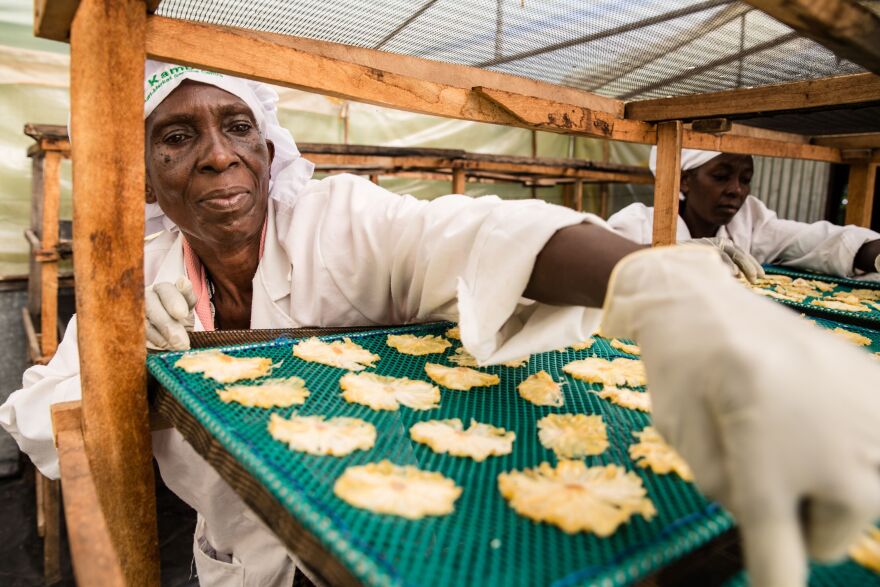When you hear the word entrepreneur or startup, there’s typically the connotation of reaching the bottom line of profit.
For two young Wisconsin entrepreneurs, that connotation almost led them away from starting a business. Josh Shefner, 23, and Claire Friona, 21, wanted to put their engineering skills to use but have it mean more than meeting a bottom line. So, they started Agricycle Global, a Milwaukee-based social enterprise. Their latest project, Jali Fruit Co., tackles the problem of food waste.
Every year, 2.8 trillion pounds of food is wasted. In Sub-Saharan Africa, more than 90% of food waste occurs before it even reaches the market. To help address this issue, Jali provides equipment to make natural, sun-dried snacks of mangos, pineapple and jackfruit that are grown by women farmers in Sub-Saharan Africa and the Caribbean. More than 11,000 rural farmers are part of a network of 40 cooperatives.
Shefner, Agricycle's founder and CEO, says he "hated" the term entrepreneur and "fell backwards" into entrepreneurship. Originally, their model to help people was based on becoming a nonprofit, but they found that model difficult to be sustainable.
"For us, what we ended up creating is this market-based solution to extreme poverty. So it's something that's sustainable, can grow to scale, and that's what attracted me most to social entrepreneurship," Shefner explains. "So I would say that we're social entrepreneurs. There's a triple bottom line — it's people, planet and product. It's not just profit."
"We're social entrepreneurs. There's a triple bottom line — it's people, planet and product. It's not just profit." - Josh Shefner
The network empowers farmers around the world with a wage that is up to seven times higher than the average local farmer. It also utilizes a passive solar dehydrator designed by lead engineer and co-founder Friona and manufactured in Elkhorn, Wis. The dehydrators are shipped directly to the farmers who are trained in its use to create shelf-stable and ethically-sourced snacks.
"Passive refers to the fact that [the dehydrator] works off of the heat of the sun," Friona notes. "The sun heats up the dehydrator and hot air rises, and that hot current of air rising through the fruit is what dries it out."

Shefner notes that telling the story of where the fruit comes from was central to their mission.
"When we talk about farms and cooperatives, the farms that we talk about it's less than 50 trees," he says. Most of the fruit that is wild harvested are family ancestral trees that are planted with each new generation on a family farm.
Each bag of dried fruit has a QR code that links the fruit directly back to the women who dried the fruit, the farmers who grew it, and where in the world it comes from. "I think that's a really special part of our product," says Shefner. "We make sure that we're able to share that empowering, happy story of the people who are growing the fruits."
As for the origin of their company name, the word "Jali" in parts of West Africa means "a musical storyteller" who communicates the history of a village or tribe according to Shefner.
"It's so relatable to what we're doing that we're trying to share the stories of the women that we work with, and of the farmers that we work with, and the refugees that we work with. And so, in some ways the Jali Fruit Co. is the 'Jali' for the cooperatives that we're partnered with," he explains.

Friona and Shefner agree that while there have been challenges, the business took off once they stepped away from school and from learned assumptions of the "right way" to run a business.
Friona says she felt "stuck in this box of engineering" while she was studying at school but realizes the way to make a difference was "to bring in the engineering mindset in the business side and to use the problem-solving skills I had learned in college and bring them to a business."
Since Friona met Shefner after he made a presentation on humanitarian engineering in a college honors course, "it's just been a lot of leaps of faith into just going for it," she says. Friona decided last fall not to re-enroll in school, and says "it's been the best decision of my life."
Shefner also needs a few classes to complete his structural engineering degree, but going back to school is now second to the growing business. "For the last two years of college, I basically loaded up my course schedule and any class that required homework or work outside of class I would drop because I was trying to build a business. So in the end both of us are currently degreeless," he admits.
"It's worked out fine so far," adds Friona, laughing.






